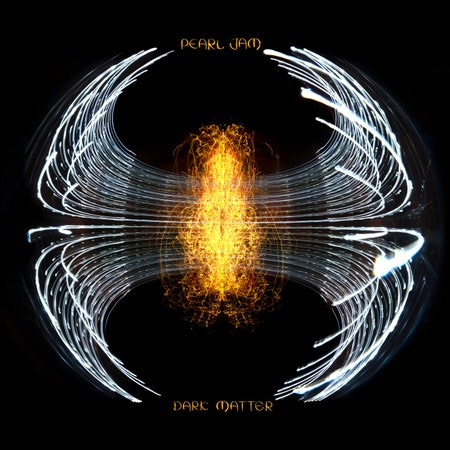Pearl Jam, Dark Matter (2024)
“'You’re hurting yourself, it’s plain to see/I think you’re hurting yourself just to hurt me,' sings Eddie Vedder on 'Scared of Fear,' . . ."
Release Date: April 19, 2024
Label: Monkeywrench, Republic
Length: 48:21
Produced By: Andrew Watt
Rating: 6.5
Review by: Alexander Hellene
Highlights: “Scared of Fear,” “Wreckage,” “Dark Matter,” “Running,” “Something Special”
“You’re hurting yourself, it’s plain to see/I think you’re hurting yourself just to hurt me,” sings Eddie Vedder on “Scared of Fear,” the opener to veteran American band Pearl Jam’s twelfth album, Dark Matter. “We used to laugh, we used to sing/We used to dance, we had our own scene.” Is this scene Seattle? The music world in general? Is Vedder contemplating the fact that he’s almost 60 and still plying his trade in the fickle world of entertainment, having survived all of the bumps and bruises of falling into and out of fashion, of various scenes, until you become a mainstay? A, dare I say it, legacy act? Is this a lament to others in his orbit, or to the fans that are his age and might have turned against the band?
In typical Vedder fashion, it’s a little murky, but there’s a sense of surviving and holding on all over Dark Matter. Fitting for a band that, outside of Vedder’s powerful and emotive baritone, always struck me as not being particularly distinctive. Pearl Jam didn’t do riffs like Soundgarden or Alice in Chains, earworms like Nirvana, or weirdness like The Melvins or Mudhoney. Pearl Jam, like a lot of the 90s so-called “grunge” scene, really repurposed and repackaged all of the classic rock tropes they grew up with for a younger generation—maybe listeners didn’t know who Led Zeppelin or The Who or Neil Young or Jimi Hendrix were, but Pearl Jam did. They also knew about R.E.M. and The Ramones and other less-Boomer bands, put it all together, and exploded out of the Seattle scene relying on heart, earnestness, and a very workmanlike approach to songwriting. Vedder, guitarists Stone Gossard and Mike McCready, bassist Jeff Ament, and drummer Matt Cameron understand how to craft a melody, how to write a chorus, and where and when to put a middle eight, creating a bed for Vedder’s heart-on-his-sleeve lyrics and delivery; you might not like his very 1990s “yarling” style of singing, but Vedder is probably the best there ever was at it.1
But that’s the thing: take out Vedder and what you’re left with is a very perfectly cromulent rock band. Everything is in its right place. These guys are craftsmen, they know what they’re doing. Take “Scared of Fear” as an example. It’s a very good song, a dramatic, anthemic fist-pumper with some cool choppy rhythms and slightly caustic guitar. Interest is generated by a descending chord progression in the chorus over which the guitars continue to rise. Though the halftime mid-section is exactly what you’d expect, the band builds back up to a satisfying out-chorus, and I’m glad that Gossard and McCready put a guitar solo there, and all over this album. But like the band itself, neither axe-slinger takes any real risks or has a particularly unique style; unlike, say, Jack White, whose solos are idiosyncratic and instantly recognizable, Gossard and McCready’s are purely functional: they are what you expect. And so is Dark Matter.
This doesn’t make the album bad. There are, in fact, other good songs that highlight the various styles Pearl Jam has honed to a fine point over the past three decades. “React, Respond” has a high energy groove with a main riff that sounds like the Red Hot Chili Peppers’s “Can’t Stop,” but with effort put into it; the chorus, however, despite featuring some interesting harmonic minor movement, fizzles where it should crackle.
The title track fares better, with a downbeat heavy groove and good chord motion, plus a little flavor; it sounds like one of the guitarists is toggling his pickup selector, adding a cool tremolo effect in between the phrases. I like the unison riff that ushers in the chorus, and the tom-heavy drums that cycle back to the next verse.
Speaking of drums, whoever thought that those highly reverbed arena-ready 80s style drums would fit Pearl Jam, of all bands, should be beaten with a whole barrelful of Mötley Crüe records. This is the sort of music, and sort of band, that begs to be produced in a scruffy, raw, rough-around-the-edges style, not this booming, quantized, and over-compressed slickness that only adds to the relative facelessness of the instrumentation. For a bunch of Neil Young and Bruce Springsteen fans, this is produced more like late-era Metallica. And Cameron, known for his work with Soundgarden, is a fantastic drummer, but a song like “Dark Matter,” especially in its rhythmic and spacious middle eight, needs to breathe. There needs to be a push and pull. They’re going for a Led Zeppelin-sized swagger, but instead comes off like, I’m sorry to say, Creed. Which is too bad, because this is an album highlight, especially near the end when Vedder belts out some of his patented ragged screams.
This drum sound doesn’t ruin everything, though. Banger “Running,” transcends the bog-standard punk drumbeat of its opening2 to be one of Dark Matter’s best, most bracing and abrasive numbers. However, it’s on the ballads where Dark Matter shines. “Wreckage,” a strident, mostly acoustic workout is the sort of thing that influenced bands that influenced Pearl Jam.3 It has a lovely chord progression with some cool bass movement and a catchy vocal melody (“Coming through the wreckage”). “Something Special” is twangy, mid-tempo, and features some unconventional chord choices like the I-iii-VII-V movement in the verses, that really catch the ear. It must be said that Vedder shines on songs like this; I wouldn’t mind if Pearl Jam put out an album entirely composed of ballads.4
But that’s the thing: Pearl Jam sounds best when they play it safe. This, in the absence of any gimmick or hook to get lodged in your ear, can translate into songs getting lost. “Got to Give” has some pretty fingerpicking and organ that gives way to a Black Crowes/Aerosmith drumbeat; it’s another anthemic rocker, very American sounding, though aiming for the grandeur of The Who5—the middle eight is probably the most dramatic thing on the album. But there aren’t enough distinguishing features to make it stand out. Ditto for “Won’t Tell.” It sort of reminds me of some of Pearl Jam’s earlier work, and has one of Dark Matter’s better choruses, but if you take away Vedder’s vocals, it could be anybody playing this.
Unfortunately, when Dark Matter tries to play a bit more with the band’s influences, or stretch out away from their bread and butter, the results are just embarrassing. I can’t believe a band that’s been around for this long thought the Pink Floyd pastiche “Upper Hand” was a good idea. The intro rips both some chord sequences and the guitar tone from “Time,” adds some organs and stuttering guitars that bring to mind both the middle part of “Echoes” and the ending of “A Saucerful of Secrets,” before a drum fill straight out of Nick Mason 101 leads into a slow-burning bluesy groove that might as well be a new part of “Shine On You Crazy Diamond”—even the guitar break between verses is nicked from that song. The band should be ashamed of itself, but I guess they weren’t banking on most listeners being Floyd fanatics. At least the shift to a major feel in the chorus is quite effective. Pink Floyd isn’t the only band they riff of off, though, getting all “Freebird” at the end with the ascending three-chord vamp and attendant guitar solos.
It’s followed by “Waiting For Stevie,” which is . . . I don’t know. A shout-out to 90s psychedelia revivalism, maybe? The main riff and chord progression sound like something from one of Oasis’s lesser releases, and the whole thing is turgid and stiff despite some interesting drum fills. People: stop quantizing your drums. There’s another extended vamp at the end, and maybe this song kills it live. It doesn’t on here; the best part is the little hymn-like coda at the end which only lasts ten or so seconds and makes me wish they wrote the entire song around that. By the time we get to closer “Setting Sun,” we’re thankful for the interesting percussion and hopeful I-IV chord progression and an honest-to-goodness modulation. Yeah! There’s another extended outro, but this one gives way to some delicate strummed acoustics and Vedder intoning “Let us not fade.” It’s an effective closer to an album that otherwise gives listeners exactly what they’d expect from a Pearl Jam album in 2024.
This is damning with faint praise, but I’m glad there’s still a market for Pearl Jam. I’m glad they still have legions of fans. This sort of amped-up college rock needs to be kept alive, and while it might be a bit of a stretch to say that Pearl Jam influenced the emo movement of the late 90s and early 2000s, there’s such an emotional, almost feminine vibe to their best stuff I can’t help but trace the lineage. It’s just that, this late into the game, Pearl Jam has expectedly settled into a comfortable groove, and I guess they’re happy to ride that into the sunset. And good for them. We should all be so lucky to have such a long career doing what we love.
Dark Matter
Scared of Fear
React, Respond
Wreckage
Dark Matter
Won’t Tell
Upper Hand
Waiting for Stevie
Running
Something Special
Got to Give
Setting Sun
Alice In Chain’s Layne Staley was as well. Others prominent practitioners of this style of singing include Creed’s Scott Stapp and, to a degree on their earlier albums, Stone Temple Pilots’s Scott Wieland.
You know the one, played mostly on the toms: “boom-boom-BAP bapaboombadoom-BAP”
Maybe they have and I’m just not aware of it; if that’s the case, please let me know.
Pearl Jam are devoted and outspoken Who fans, which is something I like about them.






I'm a weirdo that prefers Yield and Binaural to Pearl Jam's earlier works (though Vs. and Vitology go pretty hard at times).
In general, I think they've always had trouble coming up with a full album's worth of interesting songs, but the good songs always go so hard, it's easy to ignore the filler.
Thanks for this review, last time I listened to Pearl Jam, they seemed like they were drifting towards adult contemporary. Sounds like that's not the case at all!
I have to get around to listening to this (and their last album, where I liked the single but didn't get much further) at some point because I used to be a massive Pearl Jam fan in high school. I do think they were a little more distinctive in their prime than you give them credit for, they had better hooks and melodies than most of their imitators. I found several of their later albums pretty blah and had stopped paying attention by the time I got out of college, but have been listening to their 2003 album Riot Act quite a bit recently. In fact one of my recent posts was named for a song on that album.